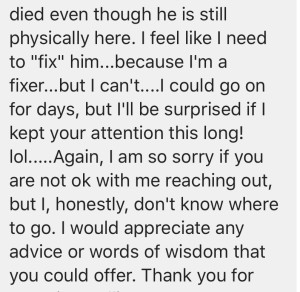 A few weeks ago, I received a heartfelt private message from a mother who is just confronting her young son’s likely autism diagnosis. She had read a previous post of mine on recognizing signs of autism in your child and saw it in him. And she was falling apart inside. Her love for her son was evident, but she admitted she was struggling with her feelings of fear and worry and didn’t know how to move past them. She asked me how I coped with my own son’s diagnosis. I’ll admit it feels funny to me to be asked that question just 6 years later. I don’t quite feel my veteran status yet. But I realized that while I’ve been busy doing doing All the Things that I really have come far. I’ve changed in ways I didn’t anticipate. And she will too. So, I made a list of what I think helped me to “cope” and, more importantly, what it’s been helpful to avoid. Here is what I learned.
A few weeks ago, I received a heartfelt private message from a mother who is just confronting her young son’s likely autism diagnosis. She had read a previous post of mine on recognizing signs of autism in your child and saw it in him. And she was falling apart inside. Her love for her son was evident, but she admitted she was struggling with her feelings of fear and worry and didn’t know how to move past them. She asked me how I coped with my own son’s diagnosis. I’ll admit it feels funny to me to be asked that question just 6 years later. I don’t quite feel my veteran status yet. But I realized that while I’ve been busy doing doing All the Things that I really have come far. I’ve changed in ways I didn’t anticipate. And she will too. So, I made a list of what I think helped me to “cope” and, more importantly, what it’s been helpful to avoid. Here is what I learned.
- I quickly realized that I needed a support group. My own circle of friends, though lovely, simply couldn’t identify with what I was experiencing. And they never will, any more than I can identify with bankruptcy or diabetes. I simply haven’t experienced it. Yes, they will still be important to you. But you need to collect some friends who “get it” – both those who are where you are now and those who are where you will be in a few years. For me, I found those folks online. I experimented with a few online support groups and over time found people I could turn to on dark days. Folks who were able to fully celebrate with me on good ones. You need to process all of those emotions in a safe place in order to recycle them into something more productive for your child. And, more importantly, you need to make certain that he never views himself as something to be “coped.” Go join a few online groups today. After a while, you’ll figure out which places you fit best. Find your tribe. They’re out there.
2. I stopped saying, “Somebody needs to ______”, “There oughta be ______”, and “I wish ______.” I realized that those things don’t happen unless someone makes them happen. I decided to spend my time making things happen. I started a nonprofit to bring elopement tracking bracelets to our county. I began a Sensitive Santa ministry. I asked the superintendent to allow me to begin teaching autism awareness in our school district. I began a local special needs support group on Facebook. I harassed our grocery stores into acquiring carts for those with special needs. I joined a national research study (SPARK by the Simons Foundation). I did these things because doing feels better than not doing. Because doing is contagious. And because doing brings heightened consciousness of my son and his needs to the community he will one day live in as an adult. A community I wanted to welcome and support him – but a community I knew wasn’t yet ready to do so. None of this stuff was easy for an introvert. But it’s far more therapeutic than waiting around for someone else to do it. Because they never will. There is no someone else.
 3. I immersed myself in learning about the IEP process, IDEA, special education, and now life after high school. Do not be fooled into believing that a school district will have your child’s best interests at heart. The people working for them will want to. But their budgets are severely limited. They’re trying to serve the most with the least. That absolutely means they will attempt – however kindly – to limit the services your child receives. That sucks for us all – including them (because schools ARE staffed with good people). But your job is your child, and you don’t want to have those regrets. Read From Emotions to Advocacy by Wrightslaw. Right now. Don’t wait until there are problems. Don’t wait until he starts school. Do not wait.
3. I immersed myself in learning about the IEP process, IDEA, special education, and now life after high school. Do not be fooled into believing that a school district will have your child’s best interests at heart. The people working for them will want to. But their budgets are severely limited. They’re trying to serve the most with the least. That absolutely means they will attempt – however kindly – to limit the services your child receives. That sucks for us all – including them (because schools ARE staffed with good people). But your job is your child, and you don’t want to have those regrets. Read From Emotions to Advocacy by Wrightslaw. Right now. Don’t wait until there are problems. Don’t wait until he starts school. Do not wait.
4. I gave up the notion that communication must equal speech. They’re not the same. Your son might speak verbally. He might not. But he can be taught to communicate right now. It might be via pictures or other assistive technology. (In my opinion, that’s not sign language. He’s not deaf, won’t be a member of the deaf community, and just how many people do you know who are fluent in it? He needs to be able to communicate in a way that the most amount of people can understand him immediately.) And don’t let anyone convince you that alternative means of communication will prevent him from speaking. All evidence is to the contrary. But hear me on this: Nothing – and I mean nothing – is to take greater importance than teaching him to communicate in whatever way he proves able. Once he can communicate effectively, everything else gets better. Most importantly, for him.
5. I found an excellent behavioral therapy clinic. Those folks were the cavalry arriving. I made certain they were a good fit – for some are better than others. (There were dark days in behavioral therapy in the past, so you need to interview them and make sure you’re on the same page.) I insisted that my goal was not to make him not autistic, but to help him to fully access his world to the extent he’s able. To help him to communicate and to learn. To assist me in learning how to positively shape his behavior. To assist me in learning how to teach him myself. They know how to do this without screaming, crying, and desperation. I found a team who didn’t give a damn about flapping, stimming, and other recognizable autistic behaviors. A team happy to let me observe and work with them so they could teach me how to help him too. Keep going until you find the same. But your life will change, because your child’s independence and happiness will change.
6. I stopped following autism pages of people constantly whining and posting negative memes about autism (i.e. “Autism sucks.). Instead, I follow doers and advocates. (Feel free to go find some on my Page and Twitter.) That serves both my son and me. My son is autistic. Constantly reading and lamenting that something that is fundamental to his mind and life “sucks” isn’t helpful. It’s not accepting. Ultimately, it’s not loving. And it distracts from the good that happens and can be made to happen. No, it’s not all sunshine and flowers. (That’s what your support group is for.) But I refuse to propagate a message that everything about my child is a negative. Because all your friends, all your family, and even your community are watching. They’re picking up your cues. Do you really want to send a message that he’s a loss to be written off? I’m thinking not. And do you want to send him a message that he is less than who you dreamed of? No, I already know you don’t. Share his triumphs. Advocate for his needs. It’s okay sometimes to share the sad stuff, so that others may feel compassion for his challenges. But don’t compromise his worth to his community and his dignity. You’re his protector. That may include protecting him from yourself on bad days when you want to shout from the rooftops that toileting accidents suck. They do, but would you want your loved ones to post it on Facebook if it were you? Protect his dignity – whether you believe he’s aware of it or not. You owe him that.
7. I took autism right out of the closet. He is not a secret. I am not ashamed by him. It’s not my job to apologize for him, because he has nothing to apologize for. But it is my job to help his world understand him better. I explain his differences to others, particularly other children (they’re miles ahead of adults in capacity to learn acceptance). I allow others to ask questions and give them tips to better interact with him. I encourage servers to look at the menu pictures he points to. I give others a chance to help him navigate his world. They want to. They just don’t know how. Help them. If you need to, visit his classroom and talk to his peers. Stand up and speak to your church. Ask for what you think he needs. Later, teach him to ask for himself, if possible. You’d be surprised how good other people can be when you give them a chance.
Confidential to A.K.: You can do this. Because “this” is just loving and nurturing your child. Yeah, it’s a stepped up level of parenthood for sure. But I hardly need say he’s worth it. If you’re not feeling optimistic the future will be bright, then operate on the assumption it will be. Keep going and doing until you believe it. Then do everything you can to ensure it. Have no regrets. Try to remember that the child you envisioned never existed. Stop mourning that child. Because the child you’ve been blessed with has been here all along. You just didn’t recognize him yet. Love who he is.
Congratulations on being given this atypical little life to shepherd. Yes, I said congratulations. I’m hoping that soon you’ll know what I mean. And one day, I hope you sit and hold someone’s hand who is in the place you are now and tell them the same. It really is going to be okay, because you’re going to make it okay.





